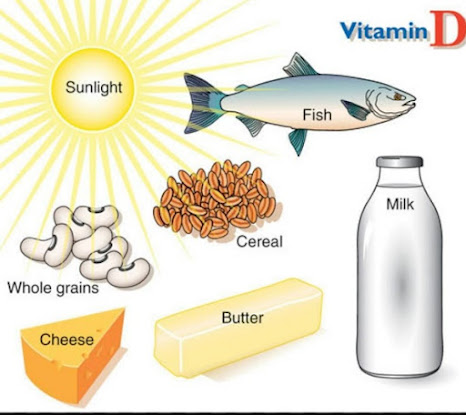Vitamin D is a group of fat-soluble secosteroids responsible for increasing intestinal absorption of calcium, magnesium, and phosphate, and for many other biological effects. In humans, the most important compounds in this group are vitamin D3 (cholecalciferol) and vitamin D. Vitamin D is also known as sunshine vitamin. According to cautious estimates, about thirteen percent of people worldwide suffer from a deficiency of vitamin D. Its deficiency leads to a decrease in energy levels. Stress and depression occur, hair begins to fall, and pain in muscles and joints starts. While fruits, vegetables, meat, and lentils contain many vitamins, vitamin D is not found in large quantities in every fruit, vegetable, or meat.
Therefore, not consuming foods rich in vitamin D leads to its deficiency in the body. Foods rich in vitamin D are extremely important for various bodily functions such as bones, teeth, muscles, and many other physiological processes. A deficiency in this vitamin makes it difficult to regulate the amount of calcium or phosphorus in the body. Its deficiency manifests in various symptoms and increases the risk of multiple diseases, including hair loss, joint pain, irritability, depression, constant fatigue, and weakness in muscles.
Vitamin D is one of the most important vitamins for the human body. It is a fat-soluble vitamin that helps dissolve fat and is required to maintain the levels of serum and calcium in the body. It aids in cellular processes, neuromuscular function, and bone ossification.
Vitamin D also plays a vital role in maintaining the immune system and preventing diseases such as osteoporosis, cancer, depression, diabetes, and obesity. While sunlight is the primary source of obtaining vitamin D, it can also be included in the diet through certain foods to fulfill the requirements of vitamin D.
Below are mentioned some food items that can fulfill the deficiency of vitamin D and prevent various diseases:
Salmon: Salmon is the best source of protein, omega-3 fatty acids, and vitamin D.
Rainbow Trout: Rainbow trout is another excellent source of obtaining vitamin D. Just 3 ounces of rainbow trout can fulfill 100% of your daily vitamin D requirement. It contains various vitamins, minerals, and proteins.
Egg Yolks: Vitamin D is only found in the yolk of eggs. Eggs also contain essential amino acids and are the best source of choline and healthy fats.
Mushrooms: Mushrooms are also the best source of obtaining vitamin D, along with vitamin B and potassium. Different types of mushrooms contain varying amounts of vitamin D, such as Shiitake, Portobello, Maitake, and Chantrelle, which relatively have higher levels of vitamin D.
Tuna: Another excellent source of obtaining vitamin D is tuna fish. Canned tuna fish is usually readily available, and tuna cans can be easily stored at home. Vitamin D can be obtained by including tuna in the diet, along with protein.
Sardines: Sardines are one of the best and nutritious fish obtained from the sea. They contain protein, essential vitamins and minerals, and inflammation-fighting omega-3s. Since sardines feed on plankton or small fish in the water, they are not heavy in metals and other toxic substances compared to other types of fish. Therefore, sardines are considered the best source of clean and healthy sea food.
Milk: Cow's milk also contains a considerable amount of vitamin D. If you drink a glass of milk daily, the deficiency of twenty percent of vitamin D will be eliminated.
Cheese: Cheese is another best source of obtaining vitamin D, which contains calcium and vitamin K. These three components together keep our bones strong. Cheese can be added to salads and vegetables. Whenever you buy cheese, try to buy it in organic and raw form.
Cod Liver Oil: Cod liver oil is one of the primary sources from which vitamin D can be obtained. Cod liver oil is also the best source of obtaining vitamin A and inflammation-fighting omega-3 fatty acids. If you don't like the taste of oil, you can also take it in capsule form.
Supplements: Vitamin D supplements are also commonly available in the market and are taken daily, but the choice of any supplement should be made only after consulting a doctor.
Beef Liver: If you don't like eating liver, this benefit will force you to eat it. Beef liver contains a considerable amount of vitamin D, along with other nutrients such as vitamin A, iron, and protein. However, it contains a high amount of cholesterol, so it should be avoided from overeating.
These are some of the dietary items mentioned that can fulfill the deficiency of vitamin D and prevent various diseases.




You must be logged in to post a comment.